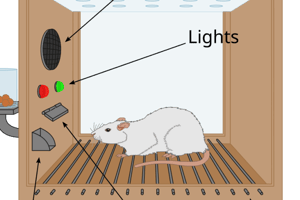Podcast
Questions and Answers
What is the Clever Hans effect?
What is the Clever Hans effect?
- Animals are only trained to perform tricks
- Animals do not respond to human cues
- Animals respond to stimuli to please trainers (correct)
- Animals can communicate with humans
What is Washoe known for?
What is Washoe known for?
A chimp trained to communicate with sign language
Who is Nim Chimpsky?
Who is Nim Chimpsky?
An experiment to test animal intelligence
What is HAL 900?
What is HAL 900?
Who is Kurt Gödel?
Who is Kurt Gödel?
Who is Roger Penrose?
Who is Roger Penrose?
What did Laplace argue?
What did Laplace argue?
What is determinism?
What is determinism?
Who is Max Planck?
Who is Max Planck?
What is quantum physics?
What is quantum physics?
What is wave-particle duality?
What is wave-particle duality?
What is the Heisenberg uncertainty principle?
What is the Heisenberg uncertainty principle?
What is hylomorphism?
What is hylomorphism?
Match Aristotle's four causes with their definitions:
Match Aristotle's four causes with their definitions:
What does 'substance' refer to?
What does 'substance' refer to?
What is an accident in terms of philosophy?
What is an accident in terms of philosophy?
What is transubstantiation?
What is transubstantiation?
Flashcards are hidden until you start studying
Study Notes
Animal Intelligence and Interaction
- Clever Hans Effect: Animals may respond to subtle cues from trainers rather than demonstrating true understanding or intelligence.
- Washoe: A chimpanzee capable of learning and using up to 175 signs in American Sign Language to communicate.
- Nim Chimpsky: Subject of a study to test animal communication, named after linguist Noam Chomsky; demonstrated less language capability compared to Washoe.
Notable Theories and Figures
- HAL 9000: Intelligent computer from "2001: A Space Odyssey," designed to mimic human emotions and thought processes.
- Kurt Gödel: Mathematician known for incompleteness theorems, asserting there are truths in mathematics that require human intuition rather than computational power.
- Roger Penrose: Physicist who posits that human consciousness and understanding cannot be replicated by machines.
- Laplace: Mathematician advocating for determinism, claiming that the universe operates on predictable physical laws.
Philosophical Concepts
- Determinism: Philosophical theory stating that all events, including human decisions, are dictated by preceding conditions.
- Material and Formal Causes: Aristotle's framework identifying the substance (what something is made of) and form (the nature of what it actually is).
- Efficient and Final Causes: Efficient cause refers to the maker of an object, while final cause refers to the object’s purpose or goal, often linked to achieving happiness.
Physics and Quantum Mechanics
- Max Planck: Discovered the dual wave-particle nature of light, pivotal in founding quantum physics.
- Quantum Physics: Focuses on subatomic particle behavior which is not in line with classical physics interpretations.
- Wave-Particle Duality: The notion that particles can exhibit properties of both waves and particles, challenging traditional physics.
- Heisenberg Uncertainty Principle: Asserts it is impossible to accurately know both the position and momentum of a particle at the same time.
Aristotelian Concepts
- Hylomorphism: Aristotle’s idea that all entities are composed of both matter (substance) and form (essence).
- Substance and Accident: Substance represents the intrinsic reality of an entity, while accidents are temporary traits (e.g., skin color, height) unrelated to the essence.
- Transubstantiation: A theological concept where the essence of bread and wine in Eucharist is transformed into the body and blood of Christ, while their accidental properties remain unchanged.
Studying That Suits You
Use AI to generate personalized quizzes and flashcards to suit your learning preferences.




